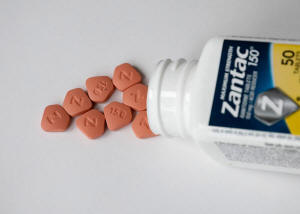GSK knew about Zantac cancer risk, attorneys tell jury in first trial
 Send a link to a friend
Send a link to a friend
 [May 03, 2024]
By Diana Novak Jones [May 03, 2024]
By Diana Novak Jones
(Reuters) - U.S. attorneys for a woman who claims her colon cancer was
caused by the now discontinued heartburn drug Zantac on Thursday told a
jury in Chicago that pharmaceutical companies GSK and Boehringer
Ingelheim knew the product could cause cancer if it was not handled
properly but failed to warn the public.
Mikal Watts, who is representing 89-year-old Angela Valadez, said the
companies knew that Zantac’s active ingredient, ranitidine, would turn
into a cancer-causing substance called NDMA as it aged or was exposed to
extreme temperatures, but did not ensure it was properly handled by
transporters, distributors and stores.
Valadez's case is one of tens of thousands against GSK, Boehringer
Ingelheim and other pharmaceutical companies, which have worried
investors in recent years. It will offer the first test of whether the
cancer claims in the long-running litigation will persuade a jury, since
all cases previously set for trial settled or were dropped.
GSK and Boehringer Ingelheim are the only defendants in the trial, after
other companies settled.
Watts told the jury the pills would change color as they degraded, but
the companies would cover it up.

“They know we’re not going to take a product that looks bad, so they put
a paint job on it,” Watts said.
Attorneys for GSK, which developed the active ingredient in Zantac but
later sold the brand to other companies, and Boehringer Ingelheim, which
sold the drug from 2006 until 2017, countered that Zantac has been
repeatedly proven to be safe and effective and that no scientific or
medical study had connected Zantac to cancer.
There is “no objective evidence linking Ms. Valadez’s cancer to Zantac,”
GSK’s attorney Tarek Ismail told the jury. “No genetic test, lab report,
imaging study… nothing whatsoever.”
Valadez, who said she took Zantac every day for at least 18 years, had a
host of risk factors that made her more likely to develop colon cancer,
Ismail said.
[to top of second column]
|

Zantac heartburn pills are seen in this picture illustration taken
October 1, 2019. REUTERS/Brendan McDermid/Illustration/File Photo
 First approved in 1983, Zantac
became the world's best selling medicine in 1988 and one of the
first-ever drugs to top $1 billion in annual sales. It was
originally marketed by a forerunner of GSK and later sold
successively to other companies.
In 2020, the U.S. Food and Drug Administration
asked drugmakers to pull Zantac and its generic versions off the
market after NDMA was found in samples of the drug. Thousands of
lawsuits began piling up in federal and state courts.
A new version of Zantac now on the market has a different active
ingredient and does not contain ranitidine.
The companies notched a significant win in 2022 when a judge
dismissed about 50,000 claims centralized in federal court in
Florida. That judge concluded that the opinions of the plaintiffs'
expert witnesses that Zantac can cause cancer were not supported by
sound science.
More than 70,000 Zantac cases remain pending in the U.S., many of
them in Delaware state court where a judge is considering similar
arguments from drugmakers that plaintiffs' expert testimony should
be kept out.
Some other cases were previously settled, including several
individual cases just before trial, and about 4,000 state court
lawsuits outside of Delaware against French drugmaker Sanofi SA.
(Reporting by Diana Jones; Editing by Alexia Garamfalvi and Josie
Kao)
[© 2024 Thomson Reuters. All rights reserved.]This material may not be published,
broadcast, rewritten or redistributed.
Thompson Reuters is solely responsible for this content.
 |